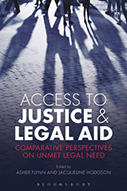Access To Justice And Legal Aid: Comparative Perspectives On Unmet Legal Need

Editors: Asher Flynn and Jacqueline Hodgson
Publisher: Oxford, UK; Portland, OR: Hart Publishing, 2017. 309p.
Reviewer: Douglas S. Eakeley | July 2017
Access to Justice & Legal Aid is a collection of sixteen essays by practitioners, scholars and government officials, analyzing the impact of, and response to, significant reductions in government funding of legal aid (criminal, civil and family) in England, Wales and Australia. In the first chapter, the editors explain: “In this book, each chapter drives home the need for a new narrative around access to justice to counter the current dominant view that legal advice is unnecessary, and that legal aid cuts are unavoidable. This collection seeks to rebuild belief in the value and necessity of accessing and understanding law; and in the value of the quality of justice through legal assistance–civil, family and criminal. Without this, we run the risk of irreversibly damaging the legal system, and hiding the true extent of unmet legal need.” To a considerable extent, the book succeeds in its objective of demonstrating the critical value of legal aid, while leaving the reader somewhat pessimistic that the current governments in the United Kingdom and Australia will take heed.
A majority of the chapters focus on civil legal aid, which has experienced significant reductions in funding in both jurisdictions. But denial of access to justice in civil legal matters can also impact the criminal justice system in myriad ways. As Melanie Schwartz puts it in her chapter “Indigenous People and Access to Justice in Civil and Family Law,” “It is important to understand that criminal justice system interventions usually represent the end of a story that often involves a range of unaddressed civil or family law issues. This is because ongoing experiences of disadvantage, disruption or discrimination in areas like housing, education, consumer matters, credit/debt, social security and child protection can escalate to become criminal law concerns . . . .”
The legal aid system in England and Wales differs significantly from that in Australia. England and Wales in 1949 adopted a comprehensive criminal legal aid program based on a “judicare” model in which the national government contracts with private attorneys to provide representation to defendants–rejecting a public defender model (although a Public Defender Service was introduced as a pilot in 2000 to provide some comparison with the fees charged and services rendered by private attorneys). Administration of the system was initially assigned to The Law Society of England and Wales, the independent professional organization of solicitors. In 1988, administration was transferred to a new institution, the Legal Aid Board, which only had two solicitor representatives on its governing body. Ultimately, administration of criminal legal aid was transferred to the Legal Aid Bureau within the British Ministry of Justice. By contrast, Australia has a “mixed model” comprising salaried lawyers who work for Legal Aid Commissions created by the State governments, independent community legal centers, and private lawyers funded through judicare. Legal Aid Commissions receive the largest portion of government funding, with State government funding focused on criminal defense, and Commonwealth funding focused on civil legal assistance in family law matters.
Despite the different models, the legal aid systems in England, Wales and Australia have experienced a similarly precipitous, downward trend in government funding. The causes for that trend go beyond the fiscal constraint imposed by current financial conditions. As Tom Smith and Ed Cape report in their chapter “The Rise and Decline of Criminal Legal Aid in England and Wales,” “the prospects for criminal legal aid in England and Wales are bleak. . . . [W]hile the need for economy and efficiency, especially following the global financial crisis of 2007-08, has been used to rationalize government policy in the first decade and a half of the twenty-first century, the roots of that decline are deeper, and reflect an antipathy not only to state welfare provision but also to procedural justice and fair trial.” With respect to Australian legal aid, Kathy Laster and Ryan Kornhauser write in their chapter “The Rise of ‘DIY’ Law: Implications for Legal Aid,” “[a]t a time when ‘law and order’ politics prevail, protecting the rights of defendants in criminal cases is not popular. . . . Unlike the more tolerant approach to the provision of ‘no fault’ universal healthcare, there is an apparent contradiction in advocating tough-on-crime measures, on the one hand, and providing funded legal representation and advice, on the other.”
This parsimonious approach to funding legal aid stands in sharp contrast to the unanimously-adopted (in 2012) United Nations Principles and Guidelines on Access to Legal Aid in Criminal Justice Systems, which provides that “States should consider the provision of legal aid their duty and responsibility . . . States should allocate the necessary human and financial resources to the legal aid system.” Guideline 12 provides further: “Recognizing that the benefits of legal aid services include financial benefits and cost savings throughout the criminal justice process, States should, where appropriate, make adequate and specific budget provisions for legal aid services that are commensurate with their needs, including by providing dedicated and sustainable funding mechanisms for the national legal aid system.” [Emphasis added.]
The decline in government support for access to justice in civil and criminal matters in England, Wales and Australia finds its parallel in the United States. Notwithstanding the U.S. Supreme Court’s 1963 decision in Gideon v. Wainwright, recognizing a constitutional right to counsel in criminal legal proceedings, state public defender offices have been grossly underfunded, leading often to unworkably large caseloads that adversely impact the quality and effectiveness of representation. On the civil side, the national Legal Services Corporation released a report in June of this year, concluding that “86% of the civil legal problems reported by low-income Americans received inadequate or no legal help at all.” Nonetheless, the Trump Administration has proposed eliminating federal funding for the Legal Services Corporation altogether.
It is also noteworthy that the United States, for all its wealth and armies of lawyers, stands virtually alone among developed countries (including the United Kingdom and Australia) in failing to provide free access to lawyers for low-income residents confronted with potentially devastating losses in civil legal matters. Scholars and advocates have debated for decades whether American courts should adopt a “civil Gideon” rule. In many instances, denial of access to a lawyer can be tantamount to denial of access to justice. Thus, for example, some 98% of tenants in eviction proceedings in New York State courts were unrepresented, while their landlords were almost invariably represented by counsel. Without the assistance of counsel, tenants are rarely able to establish as an affirmative defense that their landlords breached the implied warranty of habitability. When represented by a Legal Aid lawyer, tenants have a much greater chance – indeed likelihood – of prevailing.
In his essay “Reasoning a Human Right to Legal Aid,” Simon Rice suggests that legal aid need not be established as a substantive human right, but should be seen as a means of protecting human rights. He writes: “A commonly identified difference between criminal and non-criminal matters is that the former can carry the threat of incarceration with an implication that this threat of incarceration makes legal representation more important in criminal than in non-criminal matters. . . . It is simply not possible to say, as a general rule, that a person who loses their liberty loses ‘more’ or ‘less’ than a person who loses their home, their livelihood, their children, their reputation, their earning capacity, their freedom of expression their right to vote, and so on. . . . [L]egal aid is unlikely to be recognized as a right on its own, and there does not seem to be a need for it; the real work that legal aid has to do is ensuring the realization of substantive rights. . . . [A] right to legal aid arises only when procedural measures and reforms fail to achieve realization of the substantive right.”
Although American courts have thus far failed to follow the lead of the European Court of Human Rights in recognizing a right to counsel in certain civil proceedings, the New York City Council recently passed a bill providing tenants in the New York City Housing Court with universal access to counsel. This remarkable breakthrough reflects the recognition that the basic human right to shelter is far too often dependent upon access to a lawyer.
Access to Justice & Legal Aid presents important perspectives on the crisis in unmet legal need in England, Wales and Australia, and makes a compelling case that governments at all levels should reverse the decline in support for legal aid and address the unmet legal need forthrightly.
Douglas S. Eakeley is a Professor of Law at Rutgers Law School and former Chair (1993-2002) of the Legal Services Corporation.


